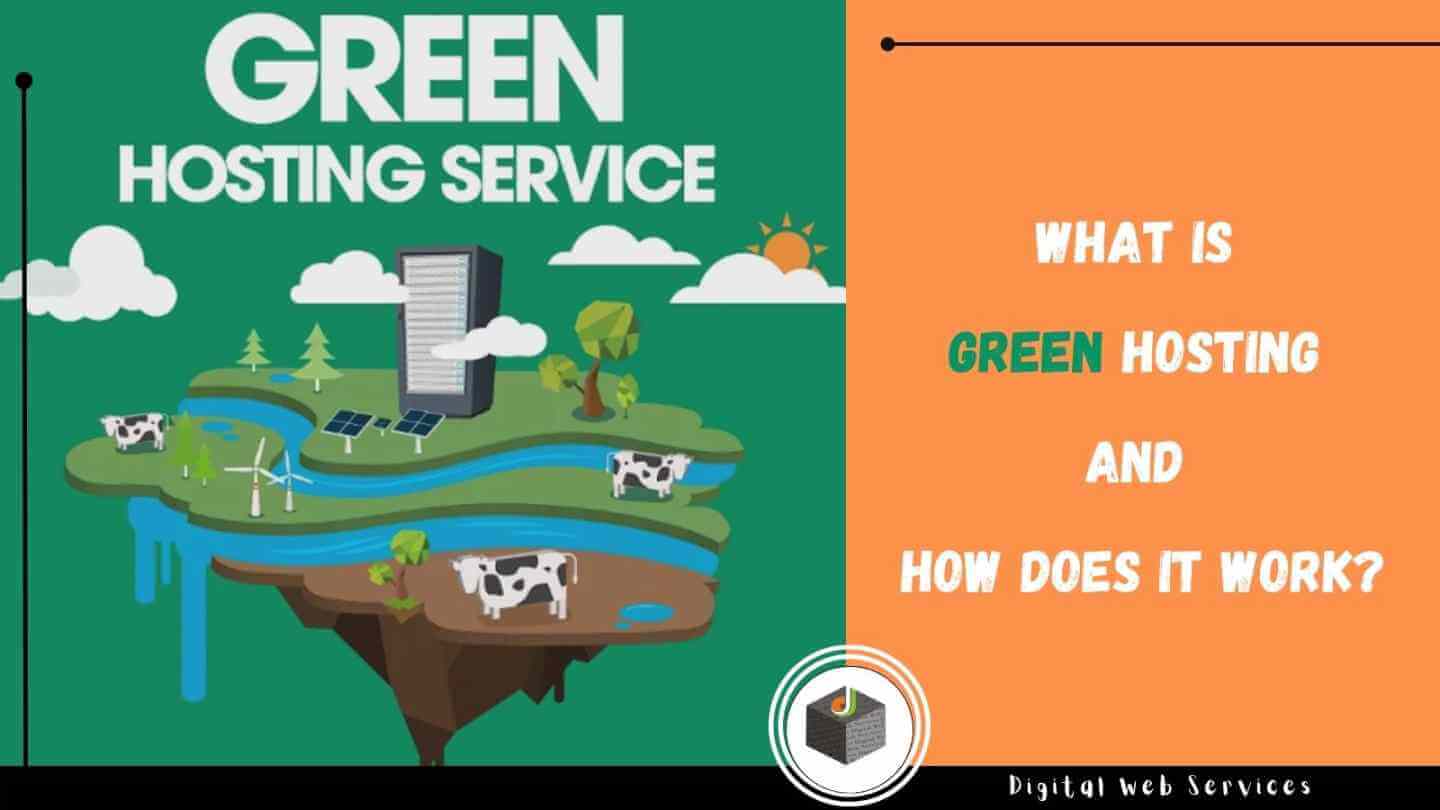
Have you ever considered the environmental impact of hosting services while choosing a server plan for your needs?
Data centers consume a lot of energy 24/7 when powering hundreds of servers and using cooling mechanisms. This tremendous amount of energy consumption leaves a negative impact on our environment.
Today, an increasing number of hosting providers are becoming aware of the impact of their business operations on the environment. So they are adopting a new type of hosting, called green web hosting, to reduce the carbon footprint of their business.
This article aims to introduce you to green web hosting and its benefits while also helping you choose a green web host. Let’s begin:
What is Green web hosting?
Green web hosting is a carbon-positive or carbon-neutral hosting solution. It utilizes renewable energy sources like sun, water, and wind to power all the hosting equipment.
The main aim of a green host is to reduce the negative environmental impact of its hosting activities. Generally, an equivalent amount of energy is produced from natural sources and returned to the grid.
In some cases, the hosting provider generates wind, solar, or hydroelectric power in-house. While in other cases, the host might choose to outsource it and get it from a green energy supplier. In such a case, the host purchases Green Tags from the certified suppliers against which a specific amount of energy is added to the grid by the energy supplier on behalf of the host.
This brings us to different types of certifications related to Green web hosting. Read on to find out more about these certifications.
Green Web Hosting Certification Types
Though there are many different green certifications, we’ll talk about the two major ones used in the hosting industry here:
Renewable Energy Certificate (REC)
Renewable Energy Certificates are created by organizations like Direct Energy and Grexel that specialize in producing renewable energy. A web hosting provider purchases these certificates to financially support the generation of green power.
Every REC mentions the amount of renewable energy that will be produced against it. So a green host can purchase as many certificates as are sufficient to produce equivalent or higher amounts of energy consumed during its hosting operations.
Here’s a sample REC mentioning the name of the company, renewable energy producer, energy credits purchased, and the amounts of emissions saved by it:
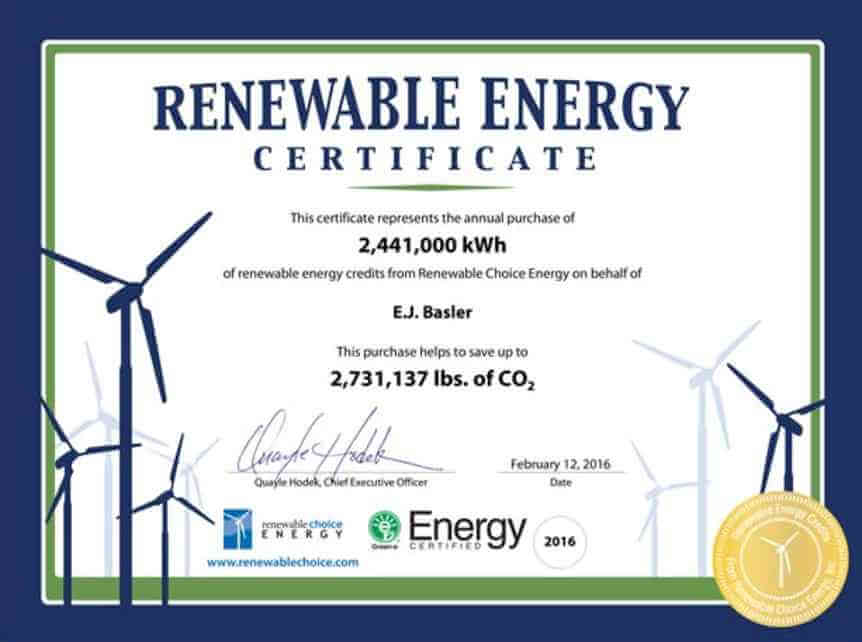
Voluntary Emission Reduction (VER)
Voluntary Emission Reduction is a carbon offset certificate issued by organizations like Endesa and Carbon Fund that specializes in counterbalancing the carbon generated from different activities. A web hosting provider purchases these certificates to offset the carbon produced from its hosting business.
Here’s a sample VER from Carbonfund, mentioning the name of the company to which the certificate is issued and the amount of carbon neutralized:
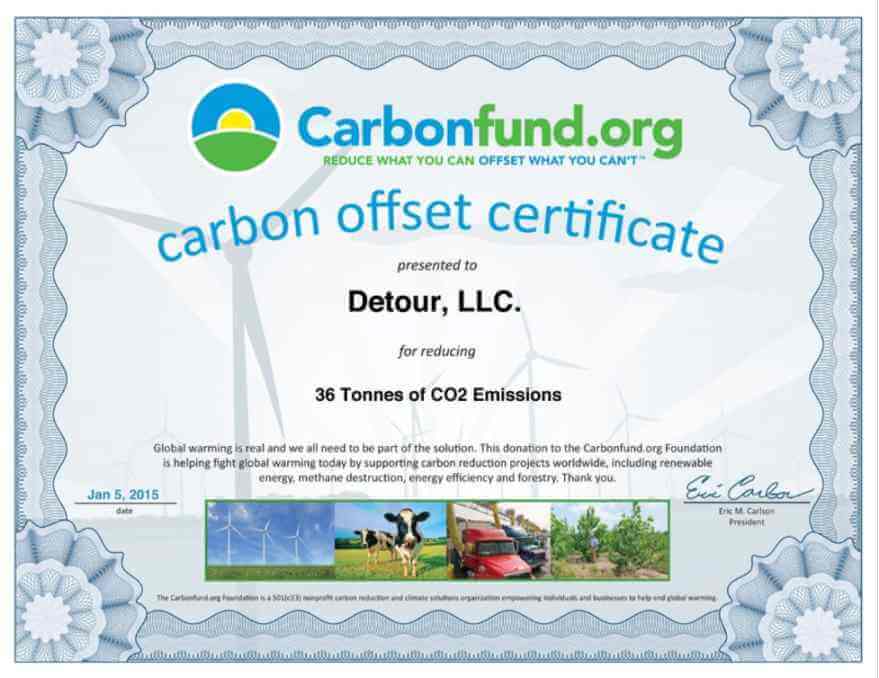
The major difference between a REC and VER lies in their approach to reducing the carbon footprint. A REC ensures the production of green energy while a VER certifies that a certain amount of carbon is reduced from the environment.
Benefits of Green web hosting
After looking at the meaning and different certifications associated with Green hosting, let’s discuss the benefits it has to offer:
Minimizing negative impact on the environment
The biggest benefit of Green web hosting lies in its environmental friendliness. This hosting aims to minimize the negative impact of hosting activities on the environment. So, in a way, green hosting is superior to traditional web hosting.
Lower web hosting costs
In the long run, renewable sources of energy are much more cost-effective than traditional energy sources. It is because of the renewable nature and abundant availability of these natural power sources.
So when the web hosting providers use green energy, they benefit from this cost-effectiveness. In turn, they pass on these lower operational costs to their customers by offering cheaper hosting plans. You can, therefore, take advantage of these lower web hosting costs while choosing your provider.
Here’s a comparison of the lowest shared hosting plans from Bluehost and GreenGeeks with their main features. You will see a considerable difference in the storage space offered by these hosts when the plan price remains the same for both these providers.
So, with the use of green energy, GreenGeeks can offer more server resources at competitive prices.
Builds a positive brand image
Today people are more aware of the environmental impact of different business activities and prefer to choose the one that cares for our Mother Earth. So you will build a positive brand image by choosing a Green host for your business website.
Eventually, green hosting credentials will attract a larger number of people to your website because of an improved business reputation. Your existing customers will also be more likely to recommend you after seeing your efforts in reducing your carbon footprint.
Here are some sample green badges offered by Kualo, a green host:
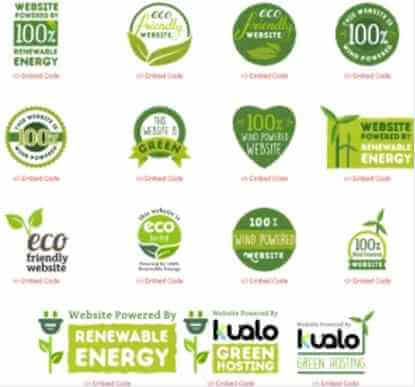
Receiving incentives and rebates
Environmental bodies and NGOs in different regions offer incentives and rebates for going green. Some of them are also ready to share your clean energy costs if you are a startup or the hosting costs are too high. So look for such environmental organizations in your area and get incentives by showing them your green efforts.
Why should you use Green web hosting?
When you choose traditional web hosting, you automatically become a contributor to large amounts of pollution generated by your hosting provider. But using Green web hosting will help you contribute positively to the environment indirectly.
You will also be encouraging your host to continue caring for Mother Nature by minimizing its carbon footprint. Additionally, you will receive the above-listed benefits for your brand or business by using Green web hosting.
How to choose a Green web host?
When choosing a Green web host for your website, look for all the aspects that you would in a traditional host. You must consider the variety of hosting services offered, the quality of performance delivered, and the availability of good customer support. Additionally, check out the following aspects when selecting a Green host:
Availability of Green energy certification
The first thing to look for in a green host is green energy certification since it is tangible proof of the hosting provider’s commitment to a cleaner environment. A green certificate will either guarantee the generation of green energy on behalf of the hosting provider or ensure to offset the carbon generated by the host during its normal business operations.
In any case, you can determine the contribution of your hosting provider towards a greener environment through Green energy certification. Here’s the green certification issued to Dreamhost:
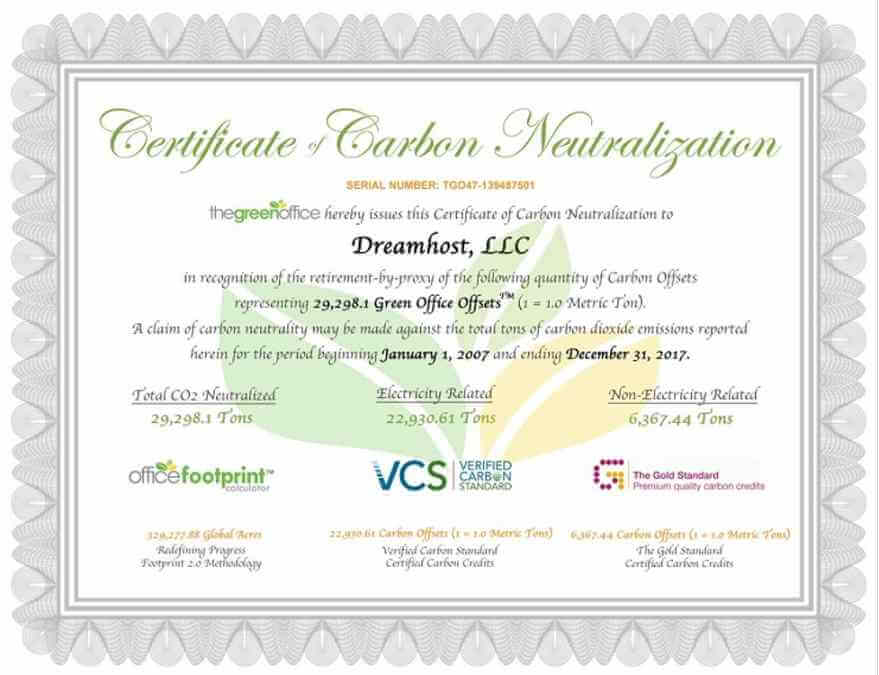
Adopting greener ways
A Green host who truly cares for the environment will adopt greener ways outside of its business as well. Such hosts usually get involved in planting trees, minimizing trash, and encouraging their employees to adopt eco-friendly habits too.
When choosing a Green host, check out the special efforts taken by the company in reducing its carbon footprint. See whether the host is adopting more and more greener ways in its daily life like using sustainable transportation means.
For instance, here are the extra green efforts by Eco Web Hosting:
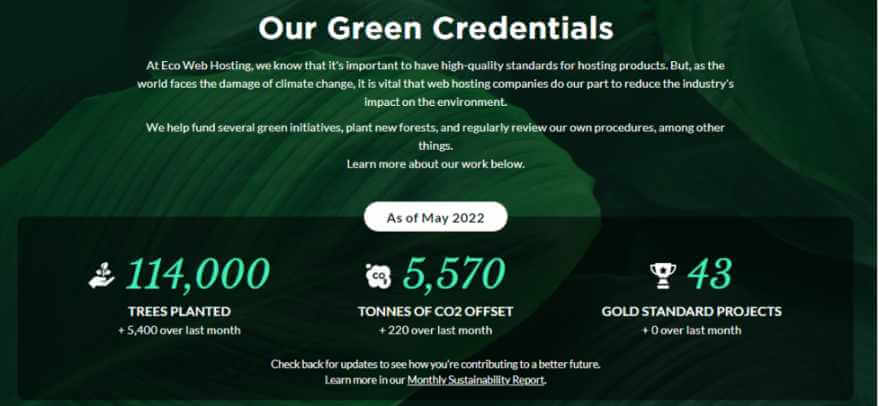
Eco web hosting is just one of many green hosts that are located in the UK.
Environment-friendly hardware components
Another thing to look for in a hosting provider is the hardware it uses. With the spreading of awareness about the environmental impact of the hosting industry, more energy-efficient components are being produced for their utilization.
For instance, a Solid State Drive (SSD) consumes much less energy than a Hard Disk Drive (HDD). Similarly, Adjustable Speed Drives (ASDs) and DC voltage regulators help in saving a lot of power. So a green host will prefer using such energy-efficient hardware items since they are more environmentally friendly.
For instance, Kualo uses energy-efficient hardware for positive environmental contribution:
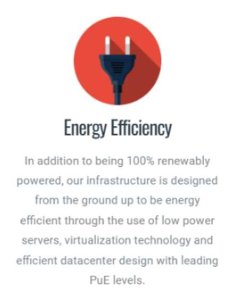
Energy-conserving software and techniques
Along with the environment-friendly hardware, you must also check out the software used by your preferred Green host. Smart software with energy-saving modes and lightweight applications can help save a lot of power.
Additionally, many Green hosts use different techniques to efficiently utilize the available storage space on their devices. Some of these energy-conserving techniques to look for when choosing a Green host include:
- Data compression: It stores all the data in compressed form to save space and minimize the transmission of traffic.
- Storage tiering: It arranges the data into different storage drives for optimum space utilization. All the content that isn’t accessed frequently is stored on low-performing drives while frequently-accessed data is shifted to high-performing storage devices.
- Data deduplication: It deletes all those copies of files that aren’t needed anymore to significantly clear up the space.
Active participation in Green campaigns
If you want to choose the most dedicated Green host that goes the extra mile to conserve our environment, look for a host actively supporting the climate change campaigns. Such initiatives are undertaken by specialized organizations like Bonneville Environmental Foundation and Carbonfund.
A green host who is seriously concerned about our Mother Earth contributes towards the green projects carried out by such organizations. Consider looking for the extra efforts taken by the green host when preferring it over another one.
For instance, Eco Web Hosting actively contributes to different eco-friendly projects around the globe:
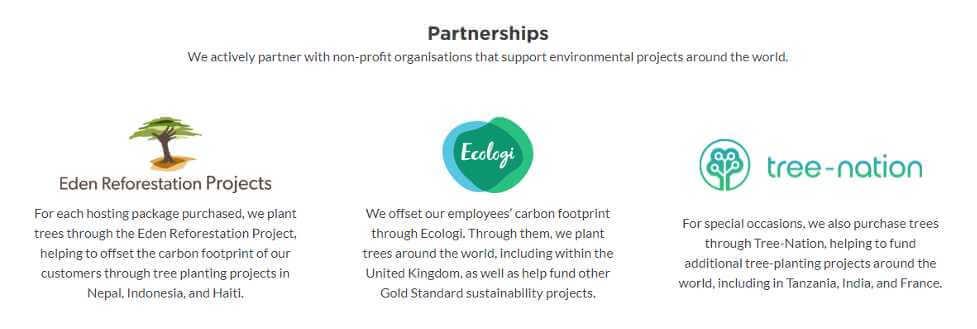
Conclusion
Green web hosting is the future of the hosting industry since non-renewable energy sources will soon exhaust and won’t be sufficient to power traditional web hosting. By choosing a green host for your web application, you can also contribute positively to the environment.
By joining the green revolution, you will also gain from the benefits offered by Green web hosting. And the satisfaction of being a clean energy user instead of being a polluter is always amazing!
Digital Web Services (DWS) is a leading IT company specializing in Software Development, Web Application Development, Website Designing, and Digital Marketing. Here are providing all kinds of services and solutions for the digital transformation of any business and website.










